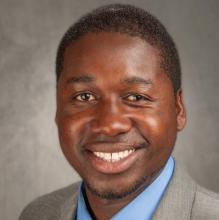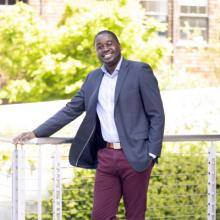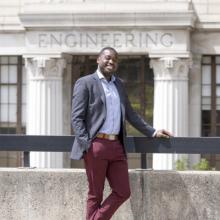Ikennah Browne
What are your main responsibilities or activities in your current position?
My current role involves assisting with complex thoracic surgery cases in the operating room as well as the daily management of post operative patients. In addition, I am involved in clinical research geared toward improving the care of surgical patients.
How does your current work relate to your graduate degree?
The MHA program provided in-depth exposure to the key elements of healthcare quality, as well as a robust approach to engaging in research centred on quality improvement. This has prepared me well for the clinical research that I am currently engaged in at McMaster University.
What do you like and what do you find challenging about your current position?
The innovative aspect of thoracic surgery is perhaps what I love most about this field. From developments in robotic surgery to the use of artificial intelligence in screening for certain lung diseases, the field is rapidly evolving, and being at the forefront of this evolution is incredibly exciting. Because of this innovative culture, my new position came with a steep learning curve as I was exposed to a range of new technologies for the first time. The challenge of becoming proficient with a range of techniques and devices is one that I am confident I will overcome over the coming months, and one of the biggest lessons I learned was the importance of prioritizing which tasks to take on first. My mentors have been incredibly supportive as I transition into this new role, and while the learning curve has been steep, I cannot think of anything that I would do differently.
Is your current career path as you originally intended?
My career path has certainly taken a few twists and turns that I did not initially envision. After completing my general surgery training in Calgary, I pursued further training in healthcare innovation, which has ultimately become a bigger focus for me. My decision to pursue the Master of Health Administration degree at UBC was made after I realized that there was a gap in my knowledge and understanding of how the Canadian healthcare system is structured, and how best to innovate within this system. The MHA has served to fill this knowledge gap and I am very happy that I pursued this degree.
What motivated you to pursue graduate work at UBC?
My decision to pursue the Master of Health Administration degree at UBC was made after I realized that there was a gap in my knowledge and understanding of how the Canadian healthcare system is structured, and how best to innovate within this system. The MHA has served to fill this knowledge gap and I am very happy that I pursued this degree.
What did you enjoy the most about your time as a graduate student at UBC?
The flexibility of the program as well as the opportunity to network with students from across the country were all highlights of my time as a graduate student at UBC. In addition, UBC Vancouver is certainly one of the most beautiful campuses in the country and it was a privilege to spend time there over the course of my degree.
How did the graduate degree at UBC help you achieve your career and/or personal development goals?
My graduate experience at UBC provided knowledge and skills that complemented my clinical training, and prepared me very well for pursuing innovative research within the field of thoracic surgery. This degree undoubtedly enabled me to be a competitive applicant for my current role and I anticipate that it will open up other collaborative research opportunities in the future.
What key things did you do, or what attitudes or approaches did you have, that contributed to your success?
One of the things that I think contributed to my success is the fact that I approached learning with a very open mind and a desire to absorb as much as I can while finding ways of making my new knowledge applicable to my career. This allowed me to maximize the MHA experience tremendously. Another contributor is the fact that I tend to be very proactive about seeking out opportunities that I think would enhance a particular skill that I want to develop. This approach is what prompted me to pursue a health economics related idea for my capstone project, and I am very happy that I was able to delve further into this field during my graduate degree and develop this new skill.
What is your best piece of advice for current graduate students preparing for their future careers?
I would advise every graduate student to be very proactive about their desired career and seek out opportunities that align with this career trajectory very early. This offers the advantage of getting some experience in the desired field very early on as well as the opportunity to figure out where one might be able to carve out a little niche for themselves. In addition, as cliche as this might sound, I encourage every student to enjoy the journey!


